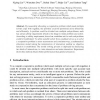Free Online Productivity Tools
i2Speak
i2Symbol
i2OCR
iTex2Img
iWeb2Print
iWeb2Shot
i2Type
iPdf2Split
iPdf2Merge
i2Bopomofo
i2Arabic
i2Style
i2Image
i2PDF
iLatex2Rtf
Sci2ools
103
click to vote
APPT
2005
Springer
2005
Springer
Autonomous-Centered Problem Allocation Oriented to Cooperation
By reasonably allocating a cooperative problem which need multiple solvers cope with together, the problem could be performed more effectively and efficiently. A problem could be divided into multiple sub-problems; each has certain ability requirement which is the hinge to relate problem and solver. According to ability requirement, the solver candidate set for each sub-problem could be established. To select suitable solver from candidate set so as to solve a cooperative problem in more autonomous and consistent way, a mathematical allocation model taking the minimization of interaction number as objective function is established. The model solving process is deployed by decreasing two kinds of interactions, i.e. intra-interaction and extra-interaction. Experiment shows this method obtains better performance than general allocation.
Ability Requirement | APPT 2005 | Certain Ability Requirement | Cooperative Problem | Distributed And Parallel Programming |
| Added | 26 Jun 2010 |
| Updated | 26 Jun 2010 |
| Type | Conference |
| Year | 2005 |
| Where | APPT |
| Authors | Xiping Liu, Wan-Chun Dou, Guihai Chen, Shijie Cai, Jiashan Tang |
Comments (0)

